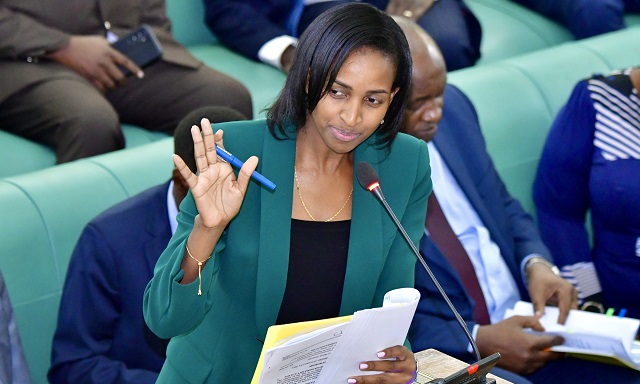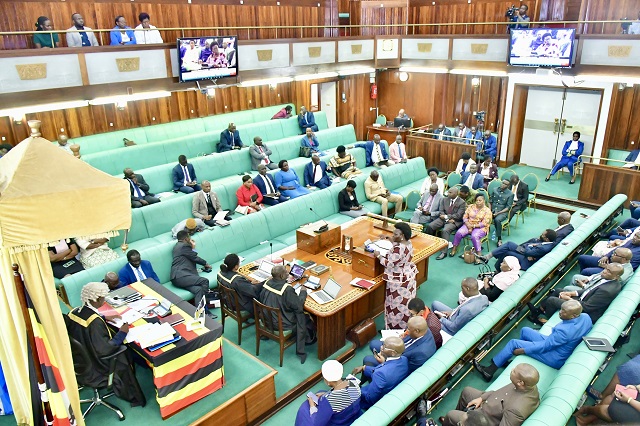
KAMPALA, UGANDA | THE INDEPENDENT | A report on the proposed 2023 Alcohol Bill tabled by Sylvia Nayebare, the Chairperson Trade and Tourism Committee of Parliament has been dismissed following findings of the joint committees on Trade and Tourism that observed that the bill fell short of addressing the real challenges like illicit trade in alcoholic drinks, alcohol abuse, quality control, enforcement mechanisms, personal freedoms, economic impact and efficacy of such controls, among others in the alcohol industry.
Whereas the Bill was expected to fill the gaps that were created by the repeal of The Enguli (Manufacture and Licensing) Act, Cap. 86, and the Liquor Act, Cap. 93, regarding the regulation of manufacturing, sale and consumption of native alcohol, to the contrary, the Bill sought to exempt the manufacture and consumption of illicit or native alcoholic drinks for domestic use from the application of the law.
MPs have asked the Government to put in place a robust legal and regulatory framework with specific provisions to curb illicit, including native brews which are increasingly becoming commercialized in Uganda.
This, they said during the discussion on the Alcoholic Drinks Control Bill 2023, in a session presided over by Deputy Speaker Thomas Tayebwa on August 13th 2024. The bill was rejected by Parliament after Attorney General Kiryowe Kiwanuka advised that it violated the 1995 Constitution.
MPs said illicit alcohol creates an unfair playing field for legitimate alcohol players since it does not pay related taxes.
“It is therefore critical that the Government applies the right level of focus to curb significant problems of illicit alcohol trade in Uganda by putting in place a robust legal and regulatory framework with specific provisions to prohibit illicit alcohol including native brews,” said Nayebare who also doubles as Gomba Woman MP.
Quoting the 2021 Euro Monitor study on the illicit trade of alcohol in Uganda, she said that the regulated alcohol industry only accounts for 35% of all alcohol consumed in Uganda while illicit alcohol accounts for 65%. According to the report, commissioned by NiIe Breweries to assess the market size of alcohol beverages in Uganda, of the 110.6 million litres of alcohol in Uganda, 67.7 million are illicit alcohol accounting for 52% of the alcohol beverage market share. Informal alcohol in Uganda is estimated at UGX 2 trillion but is not monitored by the Uganda National Bureau of Standards (UNBS) and the alcohol content.
This presents risk of increased illicit trade and an unleveled playing field for the legitimate/formal sector that contributes over 30% to the total government revenue. Illicit alcohol is any alcohol that does not fulfill official requirements including payment of relevant taxes, necessary health standards and permits, and compliance with the local laws and norms. In Uganda, illicit alcohol consists of three categories; illicit homebrew, illicit/illegal imports and sale of counterfeit and surrogate alcoholic beverages.
Illicit alcohol homebrew is popularly known as Waragi, Malwa and Tonto and surrogate alcohol includes pharmaceutical alcohol such as ethanol. Illicit alcohol is a danger to society and the economy in many ways.
While presenting the report from the joint Trade and Health Committee, Nayebare said illicit alcohol not only poses serious health risks to its consumers but also denies the country the much-needed revenue in the form of unpaid taxes.
“The Committee observes that under the Memorandum of the Bill, the Bill does not clearly state the problem that it is trying to cure. It is important to identify what mischief the Bill intends to cure. The other question is whether the proposed regulation is the best form of action in the circumstances. The Bill also does not indicate how it intends to eliminate illicit trade in alcoholic drinks.”
According to the Euro Monitor report, Ugandans shifted towards illicit homebrew with the highest volume growth over 2017-2020 recorded due to low prices. The report also indicated 18.3% Compound Annual Growth Rate value market size of illicit alcoholic drinks increased from USD577.8 million in 2017 to USD956.8 million in 2020.
Impact of the bill on the tourism sector
According to the World Travel and Tourism Council (WTC), the Tourism Sector contributed USD2 billion to the economy of Uganda in 2022. This is equivalent to 4.7 % of the country’s GDP. ln 2023 this contribution increased to 5.5%. This is still USD 400m less than what was contributed during pre-Covid 2019.
The committee recommended that the tourism tourism sector requires all the support to recover from the effects of Covid 19 and the legal framework should support and not hurt the recovery of the sector.
The Bill seeks to regulate the manufacture, importation, sale, consumption, and advertisement of alcoholic drinks, the time allowed for the sale of alcoholic drinks, prohibition of the online sale of alcoholic drinks, prohibit the selling of alcoholic drinks packed in sachets and plastic bottles and to stipulate the places for sale of alcoholic drinks.

The Alcoholic Drinks Control Bill was read for the first time on Tuesday 14th November 2023 by Opendi Sarah Achieng, Woman Representative, Tororo District and it was referred to the Joint Committee on Health and the Committee of Tourism, Trade, and lndustry for consideration in accordance with Rule 129 (1 ) of the Rules of Procedure of Parliament
Attorney General’s Advice
The Attorney General Kiryowa Kiwanuka said that from the onset the private member did not get benefits of the assistance from the Attorney General’s Chambers as required by Article 94(4).
He said that the bill in our view offends Article 93 (a 2) of the Constitution which provides that you shall not proceed on the bill which has a financial implication on the consolidated fund on an alteration of the same.
“That’s why Article 94 (4c) and Rule 121 of Rules of Procedure require a member to get assistance from the department that manages the bill that is before the house. And from the reading of the majority report, you can actually clearly see that the implementation of this bill if passed by the house will have an effect on the consolidated fund,” said Kiryowa.
He added that: So, for that reason alone, I will be moving that the bill be rejected by the house. However, I wish to add that clause 1B of this Bill actually contradicts the very purpose of this bill. This bill creates also another challenge which is, it offends a number of laws that have been passed by this house.”
Following the Attorney General’s advice, Deputy Speaker Thomas Tayebwa said: Hon. Colleagues, I try to be as accommodative as possible and liberal because I know the situation but where the law commands, I am really constrained. To be clear, I want to ask a question if you don’t want us to proceed, you will say no. If you want us to proceed you will also say yes.”
 The Independent Uganda: You get the Truth we Pay the Price
The Independent Uganda: You get the Truth we Pay the Price



